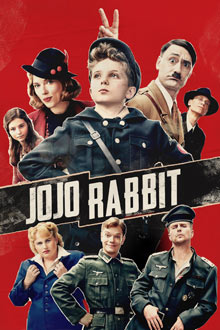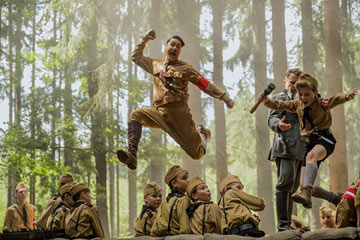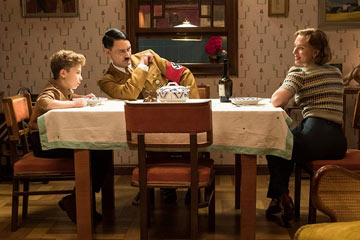

 - for mature thematic content, some disturbing images, violence, and language.
- for mature thematic content, some disturbing images, violence, and language.
A young boy in Hitler's army finds out his mother is hiding a Jewish girl in their home. (from IMDb)

Satire on its own is a tricky genre, but pair it up with WWII and the Nazis' hatred of Jews and you have a very delicate topic on your hands. Jojo Rabbit, a slight adaptation of Christine Leunens's much more dramatic 2004 book, Caging Skies, is a dark comedy that takes place during this dismal time in humanity's history, and takes a sincere look at the ugliness of bigotry and hate. Aside from director Taika Waititi taking a Wes Anderson-like approach to the film's aesthetic (think Moonrise Kingdom, but with more of an emotional oomph, and a broader comedic appeal), most of the film's quirky comedy stems from the director's own portrayal of Adolph Hitler... as a ten-year-old boy's imaginary friend. Our central hero is Jojo, a young Nazi-in-training who has let the hate towards Jews that he sees around him seep into his very being. The boy idolizes Hitler and hopes to serve him one day in his personal army. We can see from Waititi's often silly portrayal of Hitler that the boy sees him unrealistically as someone to admire and befriend--an ally, not the true monster that he is (although, Jojo does start to see that side of him as the story progresses, but more on that later).
If you've seen Thor Ragnarok or even The Mandalorian, you've seen Taika Waititi's work (and he also played/voiced Korg in Ragnarok and Avengers: Endgame, and IG-11 in The Mandalorian). With all the buzz surrounding Jojo Rabbit--particularly his win for Best Adapted Screenplay, the movie's nomination for Best Picture and Scarlett Johansson's Best Supporting Actress nomination--I was especially curious what this film was about and how Taika would handle such sensitive material. It's definitely an uncomfortable film with plenty of cringy moments as it's unusual material to poke fun at. While I "get it," there's still something about turning Nazis into comical characters and hearing their hilariously warped views of Jews that can be a little unsettling. And that's probably what Waititi is going for. Humor often brings people together and makes difficult conversations more comfortable. Still, Jojo Rabbit is a continuous tonal see-saw that tips from laugh-out-loud funny to tearfully serious and macabre at the drop of a hat.

From the start, it might take a bit to figure out just where Jojo Rabbit is taking us. The central character is a young boy caught up in a Hitler Youth camp (which I didn't realize--or had simply forgotten since my school days--was a real thing) who has succumbed to the arrogance of the Nazi regime and its hate of the Jews. All the while, Jojo's loving mother, Rosie, does her best to counteract the hate-mongering Jojo is being subjected to from the Nazis, trying to encourage the opposite in him. But Jojo is obsessed with Hitler, hating the Jews, and proclaiming the might of the aryan race. Through Jojo's projection of the imaginary version of Hitler, we see his own distorted representation of the maniacal leader and the crazed Nazi regime. But Johansson's sweet portrayal of Rosie is an endearing ying to Jojo's yang, so to speak, and her presence makes up some of the best scenes in the film (while I'm not quite sure it's "Best Supporting Actress" nomination caliber, she's still really, really wonderful here). Things really start turning around for Jojo, though, when he meets a young Jewish girl named Elsa (played brilliantly by Thomasin McKenzie), who slowly begins to change his perception of the Jews and even the hate-driven Nazi's around him. The more they interact, the more we see him and his view of Hitler begin to change, too. Since Imaginary Adolph is a figment of Jojo's own mind, we can see his dramatic inner-monologue, in a way, trying to figure all of this out as he's forced to take a much deeper look at the world around him and what he believes.
The film, although often very comedic, isn't for the faint of heart. As I touched on earlier, Waititi's tonal approach to Jojo Rabbit is a constant balancing act between the light and the heavy. Even the harrowing climactic battle on the streets of Germany is gritty, but frequently peppered with silliness--from the reveal of a flamboyant new costume that Captain Klenzendorf suddenly dons, to Rebel Wilson's Fraulein Rahm trying to arm little children and then run head-on into battle with a gigantic machine gun. (Side note -- Wilson is the only odd casting choice; She kind of sticks out like a sore thumb and doesn't really fit this film.) At one moment, Jojo is watching a soldier slowly take a bullet to the chest (with bloody results), and in the next, he sees German shepherds (actual shepherds, not the dogs) from a gag earlier in the movie fighting alongside the German army. Earlier, Waititi plays up Jojo's own twisted perception of the Jews by playing out his first introduction to Elsa like something right out of a horror movie like The Ring, and then, in another moment, Waititi's version of Hitler is as goofy as anything you'd get in a straight-up comedy, but he's often heard spouting the most ridiculous and offensively anti-Semetic things you could think of. Jojo Rabbit is certainly not the kind of movie everyone will even know how to process.

With that said, the content falls fairly within the PG-13 rating bracket, but thematically probably pushes the boundaries toward the more mature. However, there's a good chance that Waititi's comedic approach to the material is disarming enough to lighten it up a bit for a wider audience--and get more people talking about the heavy subject matter. Language isn't pervasive, but there is some blasphemy, mostly spoken by Hitler, Jojo and Rosie, and later in the film, 10-year-old Jojo shouts the film's lone "F" word in an "f- off" moment. The humor isn't frequently vulgar, but there are some brief off-color remarks, like a character saying they heard Hitler has "four testicles," or characters talking about their bizarre beliefs about the Jews, including believing that they have sex with animals and such. As the film progresses, it's made pretty obvious that Sam Rockwell's Captain Klenzendorf is gay, but it's mostly played for laughs. The biggest red flag may be the subject matter, though, and some shocking violence that comes with it. At the risk of spoiling some plot points, very early on Jojo accidentally takes a grenade to the face, and while we don't see the immediate aftermath, we see that, weeks or months later, he has little scars all over his face, arms and legs. There are also two scenes that depict public hangings of Jews and their conspirators, with the latter scene being especially surprising and emotional. Then there's a climactic battle where many characters are killed, and we see some lightly-bloodied dead bodies in the aftermath, and a brief slow-motion shot of a soldier taking a bullet during the battle (with a little blood squirting out). Lastly, another emotional scene shows a character attempting to stab another in the shoulder with a knife, with the victim stopping the attacker's hand just after the blade pierces their shoulder through their shirt. Nothing else happens, and we just see a little blood on the victim's shirt from the encounter.
Amidst its many accolades, it's easy to see why, especially in today's social climate, a film like Jojo Rabbit would grab a lot of attention -- particularly within Hollywood. It's well-crafted, at times laugh-out-loud funny, and oftentimes thought-provoking and uncomfortable. Humor can divide people, but more often it tends to unite them, and Taika Waititi has done that with Jojo Rabbit. It's a unique film that opens the reminds us of our flawed past in an effort to encourage us not to repeat those mistakes. It's a quirky film, but a thematically weighty one, and one that gets better with repeat viewings. Jojo Rabbit is artsy, entertaining, funny, emotional, but ultimately deep and meaningful.
- John DiBiase (reviewed: 2/12/20)
Outtakes (3:26) - This fun little collection of bloopers features mostly-bleeped-out bad language and the cast dancing and goofing around on set. (1 "h*ll," 1 mumbled "Oh S---" while laughing)
Inside Jojo Rabbit (29:46) - Here, the cast talks about the story and the film's characters. They comment on the film's tone being unique, and the theme being about people needing to be more loving and tolerant in this day in age. It then breaks down characters by section, starting with Scarlett's Rosie first, offering some great behind the scenes footage along the way. Next is Sam as Captain K, then Stephen Merchant as Deertz, Roman as Jojo, and Thomasin as Elsa. Taika talks about casting Roman and his sweetness as a person, and we get to see some of Roman's audition tapes. Taika then talks about playing Adolf and not wanting to be too accurate because the man doesn't deserve that level of detail. It ends by covering the costume design and film's color scheme, revealing that most of it was filmed in the Czech Republic. (1 "a" word, 3 "G-d," 1 "S" word, 1 "*ssh*le," 1 "Oh my G-d")
Deleted Scenes (8:57) - There are three deleted scenes with a Play All option. In "Imaginary Goering" (2:03), imaginary Hitler tries to show Jojo what happens when children stop believing in their imaginary friends. It's pretty funny, especially when Hitler can't get Goering to go away. (2 "g*dd*mn, 1 "Oh G-d") "Little Piggies" (3:40) is a hilarious sequence where Waititi as Hitler just keeps riffing about "this little piggy" when Jojo asks if he finds him ugly. (1 "Oh G-d") It's obvious that Waititi was having fun here and just didn't know when to end his rant, but it's quite amusing. Lastly, "Adolf Dies Again" (3:14) seems to be an alternate take of what is in the finished film. Here, after Jojo tells Hitler to "f--- off," Hitler flails on the floor and takes a long time to die before slinking across the floor out of the room. (1 "d*mn," 1 "F" word)
Audio Commentary with Taika Waititi (1:48:24) - This may be one of the most sparse and unusual commentaries I've ever heard. He opens by talking about how he doubts anyone will listen to the commentary, then disappears for a long time, letting the movie just play out before he returns to make a phone call to Roman (who played Jojo). After their brief call, he disappears for a while again, then returns for a really great phone call with Stephen Merchant (a famous producer who also played a Nazi in this film). Stephen ends up sort of interviewing Taika and they talk about the story, working together and the book that the movie was inspired by. There's then another long break of silence from him before he calls Sam Rockwell next. Their chat is also super entertaining and interesting. But it's especially during this chat where it seems like their conversation was most likely edited. Sam jumps into points that sound a little mid-thought (like this call is supposed to be spontaneous, but he kind of talks as if he knew they were going to have this conversation), and the call ends very abruptly. It had me also wondering if Taika is either not watching the movie while doing the commentary, or he was and just spread out the little bits he did record over the course of the film for the viewer. After each time he does decide to start talking again, he doesn't address what's on screen and just says "Let's watch this little bit next and then I'll come back" and will go silent for a long time. Next time he returns, he calls Rebel Wilson and the two chat briefly while she's driving to the movie lot where Taika is recording. He tells her to stop in and it goes quiet for a bit until she shows up and joins him in the recording room. After they talk for a minute or so, they both disappear again till later when he calls Alfie Allen (who played Finkel). After their chat, he goes silent until the stunt where Adolph is kicked out the window is playing out on screen--which he comments on--and then he says he'll return for the credits. Once the credits roll, he returns to talk about the theme of the movie and how it's that we should not forget our past and what we're capable of, as not to repeat our mistakes. Overall, it isn't the most insightful commentary, but the phone calls are really great and worth checking out the commentary for. (There is some mild language used here, including at least two uses of the "S" word, but overall there isn't much language in the commentary.)
- John DiBiase, (reviewed: 2/15/20)
Disclaimer: All reviews are based solely on the opinions of the reviewer. Most reviews are rated on how the reviewer enjoyed the film overall, not exclusively on content. However, if the content really affects the reviewer's opinion and experience of the film, it will definitely affect the reviewer's overall rating.
 Sanctus Real Share Encouraging New Single, "Steady" Sanctus Real Share Encouraging New Single, "Steady"Sat, 14 Feb 2026 14:31:00 EST |
 B. Cooper Drops "L2ML (feat. Steve Means, Brandi Grimsley)" B. Cooper Drops "L2ML (feat. Steve Means, Brandi Grimsley)"Sat, 14 Feb 2026 14:20:00 EST |
 Pat Barrett Releases "Break Open" From Upcoming Live Album Pat Barrett Releases "Break Open" From Upcoming Live AlbumFri, 13 Feb 2026 19:14:00 EST |
 Trip Lee Debuts BRAG Worship EP, FOR YOUR GLORY Trip Lee Debuts BRAG Worship EP, FOR YOUR GLORYFri, 13 Feb 2026 18:55:00 EST |
 Passion Announces March 6th New Album, "Just That Good" Passion Announces March 6th New Album, "Just That Good"Fri, 13 Feb 2026 18:47:00 EST |
 KB Releases Genre-Bending New Single, "BLOOD 2" KB Releases Genre-Bending New Single, "BLOOD 2"Fri, 13 Feb 2026 18:42:00 EST |
 Les and Joyce Carlsen Declare "He's God" with New Rock Single Les and Joyce Carlsen Declare "He's God" with New Rock SingleFri, 13 Feb 2026 18:30:00 EST |
 Click here All News Headlines |
Click here All News Headlines |